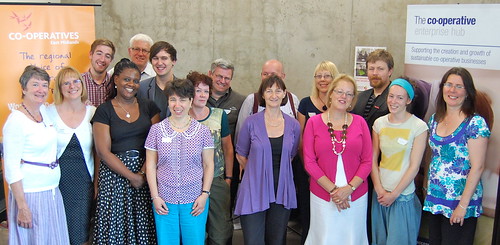
Networkers at the Creative Co-operatives event
From artists to web designers, people involved in the creative industries across the East Midlands gathered at Nottingham Contemporary to network and learn more about co-operation.
Creative Co-operatives was organised by Co-operatives East Midlands, a group that supports and promotes the movement in the region.
It was a chance for creative organisations to learn more about the co-operative business model, and for existing co-operatives to share ideas and best practice.
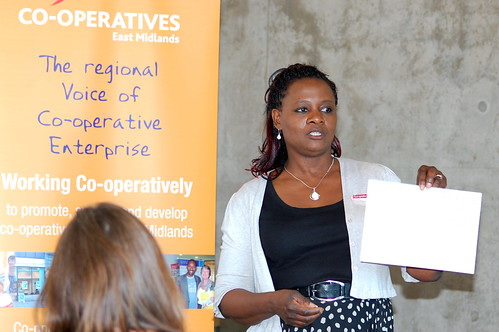
Dorothy Francis from Leicestershire’s Co-operative and Social Enterprise Development Agency
Setting the scene, Dorothy Francis from Leicestershire’s Co-operative and Social Enterprise Development Agency described how well suited the business model was for creative organisations.
“We work with 120 co-operative businesses,” said Dorothy, “and a disproportionate amount – 20 in total – work within the creative industries.”
She highlighted the work of Knighton Lane Artists Group, which provides studio space for artists; Excluded, a music production company that works with disadvantaged people, and had recently helped a homeless musician make a CD of his music; Palace Arts in Ibstock, where people had formed a co-operative to buy an art deco cinema, and were now hiring the space as a music, theatre, community and conference venue as a co-operative; and Gold Events, an events management company that stage managed this year’s Braunstone Carnival.
Networkers also heard from three co-operators involved in the running of successful creative co-ops.
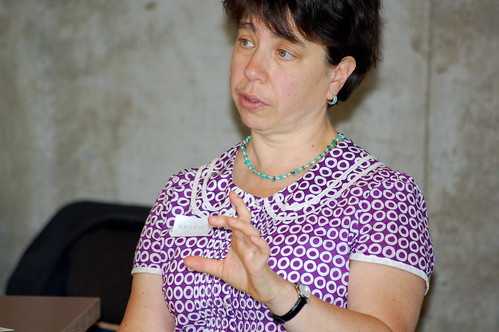
Helen Pearson from Soft Touch
Helen Pearson from Soft Touch, which works with disadvantaged young people through participatory arts, told how the co-operative had been formed 25 years ago by four people pooling their Enterprise Allowance Scheme grants.
Today the co-operative employs 14 people and works with 1,200 young people. It owns premises as well as two mobile studios, and last year turned over half a million pounds.
“The fact that we are a co-operative is the key to our success,” said Helen. “Funders demands genuine participation and inclusion and the co-operative model encourages involvement and equality in the way we work with young people.”
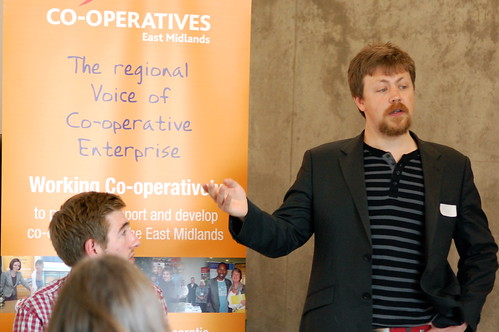
Ed Russell of Co-operative Web
Ed Russell of Co-operative Web spoke of the company’s five year journey from four founder members to 21 employees, all of whom have an equal say in the running of the £1million turnover business.
And Paul Smith from Surface Gallery in Nottingham talked about his eight-person co-operative which hires low-cost gallery space to early- and mid-career professional artists. Recently, he said, the gallery had started operating gallery tours for the deaf, with the aid of a sign language practitioner.
Dorothy said that although there are many different kinds of co-operative – from those owned by its workers to those owned by its customers, or by the community – they all shared the same values, principles and ethos.
“All businesses have a financial bottom line,” she said, “but co-operatives have extra bottom lines: ethical, social and environmental.”
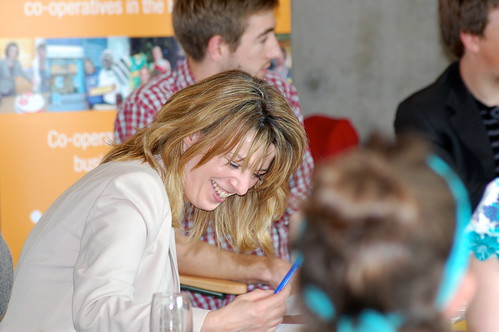
Jeanne Booth
Creative Co-operatives was run on Thursday, July 7 as part of Co-operatives Fortnight, which ran from June 25 to July 9. Delegates agreed it would not be the last meeting of the group, and intend to continue networking face-to-face and online.
Anyone interested in starting a business or organisation that is a co-operative, can find out more at www.cooperatives-em.coop
Business advice, grants and loans are available to new co-operatives through the Co-operative Enterprise Hub.

By Gemma Chambers August 16, 2011 - 4:39 pm
A really interesting article about co-operatives